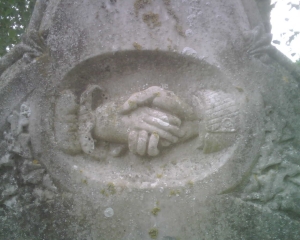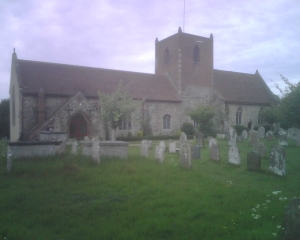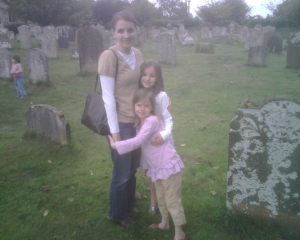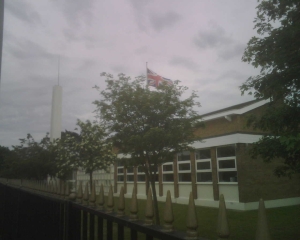Part III, Part II ½, Part II, Part I.
 My great-great-great grandfather Alfred Parker Balls lived the early part of his life in a Dickensian nightmare. We celebrated Memorial Day this year in his old haunts in the Lowestoft area, England’s most easterly point, where he experienced a combination of Great Expectations, Hard Times, and Bleak House during his childhood.
My great-great-great grandfather Alfred Parker Balls lived the early part of his life in a Dickensian nightmare. We celebrated Memorial Day this year in his old haunts in the Lowestoft area, England’s most easterly point, where he experienced a combination of Great Expectations, Hard Times, and Bleak House during his childhood.
We were on a fact finding mission, of sorts. Unfortunately, we forgot our camera so the resulting pictures were taken with my blackberry and are quite grainy and washed out. The picture above shows the decoration on a gravestone in the graveyard of a meaningful village church in our family history, as described below.
Born in 1829 in Lowestoft, Suffolk, England, young Alfred was orphaned at age 10 in 1839 when his father left him and his siblings to take care of themselves six years after his mother died when he was only four years old. He ended up with his father’s sister and her husband, who were the Board of Directors of a work house (it appears that the master and matron of a work house earned approximately £80.00/year at the time, whereas by comparison the warden of a prison earned closer to £600.00 per year). Unfortunately, because his aunt and uncle did not want to take care of him, they placed him in the work house itself as a poor orphan rather than bringing him into their own household. We can imagine that his existence was dreary and bleak at the very least during this time.
 Luckily, he attended the local parish church (possibly a condition of living in the work house?), which we discovered was almost certainly the Church of St Michael in Oulton (pictured), one mile from Lowestoft, with the other boys from the work house. While attending church one Sunday sometime between 1840 and 1843, Alfred saw his sister sitting with an aunt (his mother’s sister) in another pew. Apparently, Alfred had had bad luck in ending up with Balls relations but his sister had fared better landing with Parker relations. The next Sunday Alfred “broke ranks”, as the family history puts it, after church and “made his way to the door that his sister would come out of, and spoke to her”.
Luckily, he attended the local parish church (possibly a condition of living in the work house?), which we discovered was almost certainly the Church of St Michael in Oulton (pictured), one mile from Lowestoft, with the other boys from the work house. While attending church one Sunday sometime between 1840 and 1843, Alfred saw his sister sitting with an aunt (his mother’s sister) in another pew. Apparently, Alfred had had bad luck in ending up with Balls relations but his sister had fared better landing with Parker relations. The next Sunday Alfred “broke ranks”, as the family history puts it, after church and “made his way to the door that his sister would come out of, and spoke to her”.

Our girls at the church door where Alfred likely met his sister.
Telling the tale in 1915, Alfred remembered it as a joyous meeting because his mother’s family (Parkers) had lost touch with him after his father had abandoned the children he had had with Alfred’s mother, Susannah Parker. They sent him back to the work house but got him out the following Wednesday to live with them.
The first part of our fact-finding mission was to locate the church where this occurred, if possible. The history recorded by Alfred’s grand-niece Hazel Ballard Jones in 1915, who wrote it down as Alfred told it to her, referred to the village where the church was located as “Altoan”. We had searched high and low in maps and on the internet for a town called Altoan, first near Lowestoft but then in all of England and the UK but unsuccessfully. Only after searching in vain for “Altoan” did we look more closely at the immediately surrounding environs of Lowestoft, at which time the village of “Oulton” seemed to jump right out of the map at us. Considering that Hazel, an American, recorded the story in 1915 from the lips of her great uncle, an 86 year old Englishman only months or weeks before his death, it is entirely understandable that Oulton was recorded as Altoan. This discovery allowed us to focus our search on Oulton to find the actual village or parish church where this happened. The good people at the Lowestoft Museum assured us that there was only one church in Oulton for hundreds of years before the Methodists set up there in 1901 — the Church of St Michael. Based on this information, we felt confident that we had found the actual site of an important event in our family history when we pulled up to St Michael’s.
Finding St Michael’s was more than a sentimental effort. One dead end in our family history is with Susannah Parker’s parents (as noted, Susannah was Alfred’s deceased mother). We are searching for the name and details of Alfred’s Parker grandfather — Susannah Parker’s father. In recounting his history to his grand-niece in 1915, Alfred mentioned that after he was taken from the workhouse to live with his maternal aunt and his sister, he immediately went to work in a flour mill owned by his Grandfather Parker, his deceased mother’s father. In an effort to find out who this Grandfather Parker was, we first thought to look in the graveyard of the village church in Oulton. We arrived in Lowestoft too late to get actual cemetary plot details or death records from the county office so we thought we would just look around the graveyard ourselves. We were pleased to find both Parkers and Balls in the graveyard of St Michael’s, although not anyone that could have been Alfred’s Grandfather. We will find out his details by searching for the owners of flour mills in the area during the time period, so we feel one step closer by having straightened out the “Altoan”/”Oulton” issue.

Searching the graveyard at the Church of St Michael's in Oulton.
Alfred soon left the flour mill to become a sailor (convenient considering Lowestoft’s prominent position on England’s eastern coast) and apprenticed on a ship for over six years, crossing the Atlantic nine times (mostly to Quebec). He married Elizabeth Boyd of North Shields, Northumberland, England in 1849 and ended up having ten children with her. Around this time he gave up sea life and began working on tug boats in the North Shields area instead for several years, during which time he met and was baptized by J.J. Foster, President of the North Shields branch, in 1854, together with his wife and mother-in-law. He became a fireman and then worked for 23 years as an engineer at the Billy Mills Water Works before emigrating to Utah in 1896. In Utah he settled down in Sugarhouse with his daughter Mary Ann, working for five years at the Granite Lumber Mill before retiring. He then worked at the temple until he was too unwell to do so.
Spending the day looking for and then finding the Church of St Michael in Oulton felt like a magical experience considering the life-changing import of his encounter with his sister in that church. In fact, he might never have found the Restored Gospel if he had not been found by his family at that time and removed from the work house — instead, it is not unrealistic to think that he might have met an untimely death from hardship or malnutrition in the work house.
As an added treat, as we drove from Oulton to Lowestoft to find the road back home to London, we unexpectedly came upon the local ward house, with Union Jack proudly flying.

The Union Jack was waving above the Lowestoft Ward Building as we left the area.

Continue reading at the original source →



